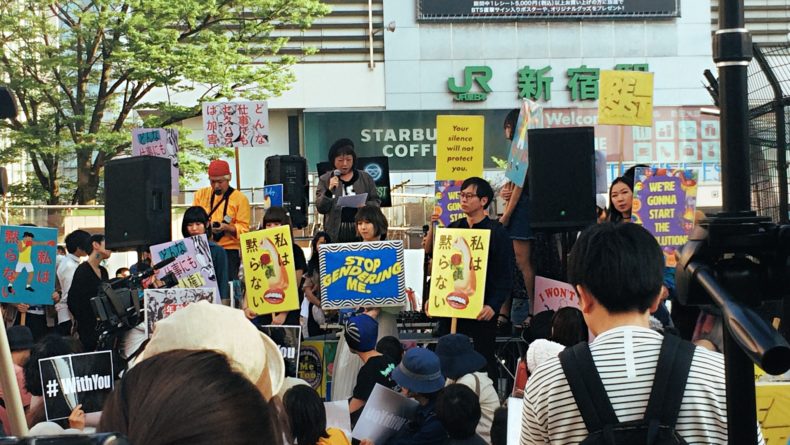Ladies & The Law: The Case That Got Sexual Harassers The Punishment They Deserve
How Two Women's Courage To Speak Up Helped Japan Recognize The Gravity Of Sexual Harassment
Savvy Tokyo's series "Ladies And The Law" dig back in time tracing the catalysts for change in Japanese laws that directly or indirectly affect women and their families. If you have a topic you would like us to cover through a real court case, contact us at editorial@gplusmedia.com
In February 2015, the Supreme Court of Japan, for the first time ever, handed down a decision relating to sexual harassment in the workplace. Prior to that, court decisions on sexual harassment had all come from lower courts.
The plaintiffs in the case were the harassers.
Yes, that’s right. Two men who had been found by their employer to have sexually harassed female colleagues had sued their employer claiming that the punishments they were given had been too harsh. Sadly, such cases are not uncommon. Men often object that they shouldn’t be punished, or should be punished lightly when they sexually harass their female colleagues.
In this historical case, however, the Supreme Court held that the punishments were appropriate.
Let’s have a look at what happened.
The two men, one a manager and one a deputy manager in the Business Department of a publicly-funded aquarium, had over a period of more than a year, victimized two female colleagues, one a dispatched worker and the other an employee of a subcontractor.
[T]he men claimed that what they did wasn’t bad enough for them to be punished.
The harassment these two women endured included: repeated “extremely explicit and indecent remarks by the manager about his sex life with his mistress, his genitalia, and his sexual appetite” when alone in a workroom with one of the women; vulgar and derogatory remarks by the deputy manager calculated to embarrass the women, such as mentioning their age, unmarried status, and low level of pay (hinting at one to prostitute herself to supplement her income); and comments by both men using “highly offensive, sickening, and humiliating words that were clearly intolerable in the workplace.”
The situation became so intolerable that the dispatched worker chose to quit her job to escape it, and the two women jointly reported the situation to their employer.
The employer approached the situation by promptly investigating the allegations of the women and determined that the two men had committed multiple acts of sexual harassment.
It is significant that the employer had in place an anti-sexual harassment policy and had required all employees to undergo training on sexual harassment prevention. Further, as a manager and deputy manager, the two men were responsible to set an example and show leadership to prevent sexual harassment. In fact, after attending the training, one of them made light of the training, saying something like “I guess I’ll have to behave myself from now on,” although his crude behavior did not change.
[T]he employer had in place an anti-sexual harassment policy and had required all employees to undergo training on sexual harassment prevention.
Having determined that multiple incidents of sexual harassment had occurred, the employer suspended the manager for 30 days, the deputy manager for 10 days and demoted each by one rank (also resulting in a salary reduction for each).
In objecting to this punishment, the men claimed that what they did wasn’t bad enough for them to be punished or alternatively that the punishment they received was too harsh. They felt they should have been given some kind of warning not to harass (they pointed out that the women never asked them to stop) and given a chance to amend their behavior, rather than being actually punished.
To reach the Supreme Court, this case had to go through two earlier trials. The first, at the Osaka District Court, found that the punishment was appropriate. When the men appealed to the Osaka High Court, that court held that the punishment was too harsh. It also seemed sympathetic to the idea that the men didn’t realize their actions were hurting the women because the women never told them so.
The Supreme Court overruled the Osaka High Court. The Supreme Court reasoned that the employer’s anti-harassment policy, the training the men had received, and their relatively senior positions meant that they should have been well aware that their conduct was unacceptable, even without being specifically told to stop. Doubtless the fact that their harassing behaviors preyed on their weakest colleagues, predominately took place in situations where there were no witnesses, and continued over a prolonged period of time also influenced the court.
This case is important because it clarifies the validity of punishing sexual harassers, rather than just slapping them on the wrist. It is a statement that Japanese society has come to the point that harassing behavior is impermissible and deserves punishment. Men (in this case) should know what behaviors are unacceptable in the workplace and should refrain from engaging in those behaviors, even in situations where they think they can get away with it.
The Supreme Court reasoned that […] their relatively senior positions meant that they should have been well aware that their conduct was unacceptable.
Even though no women are parties to this case, the case validates women’s rights by advancing the law’s position on sexual harassment in the workplace. The case could never have occurred if those two women, who had to put up with so much, had not finally been brave enough to speak out. Let us hope they can be an example to others to report harassment, just as much as the fate of the harassers can be an example to others to discourage harassing behaviors.
Vicki L. Beyer is a Professor of Law at the Hitotsubashi University Graduate School of Law Business Law Department.
















Leave a Reply